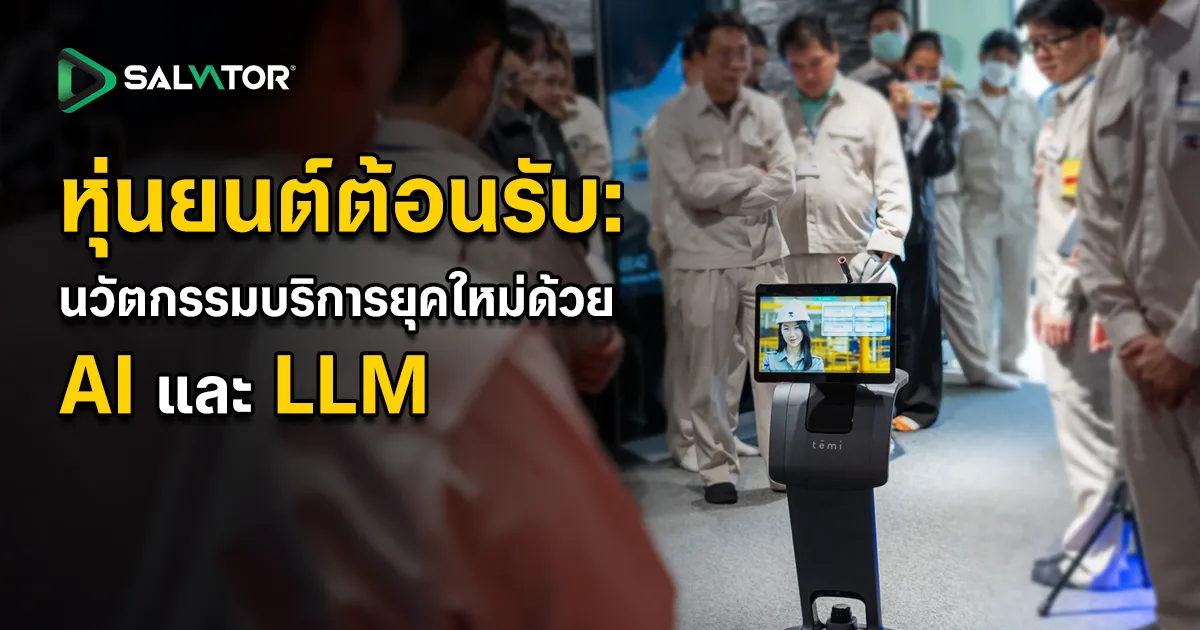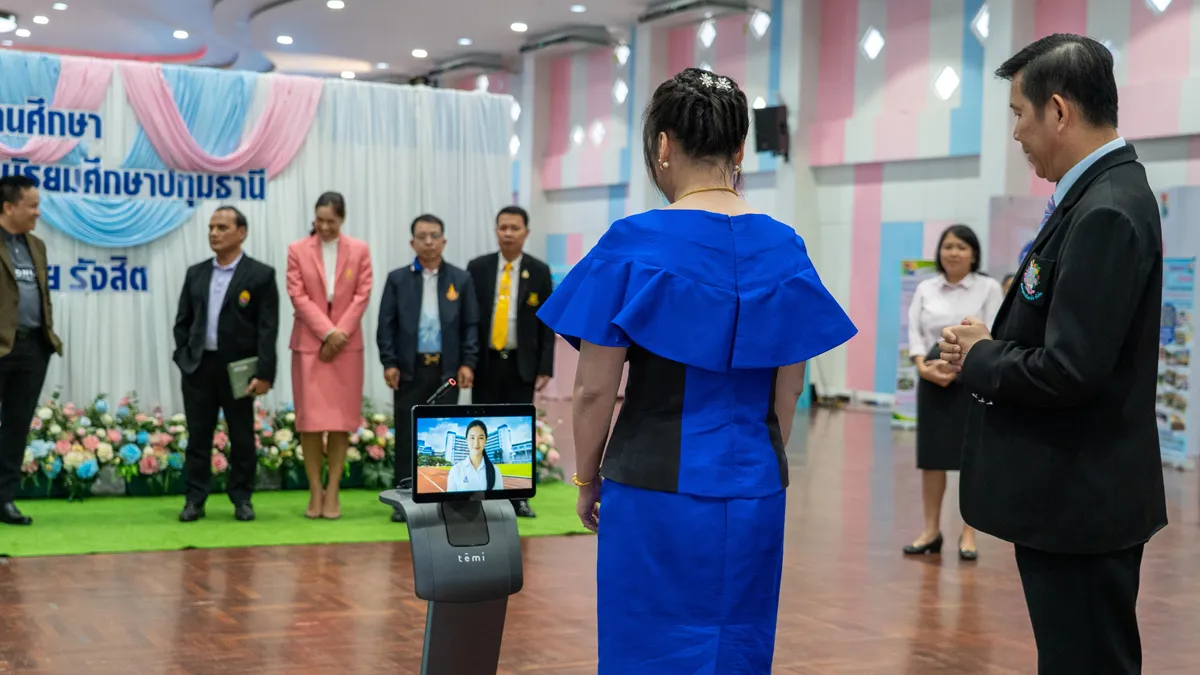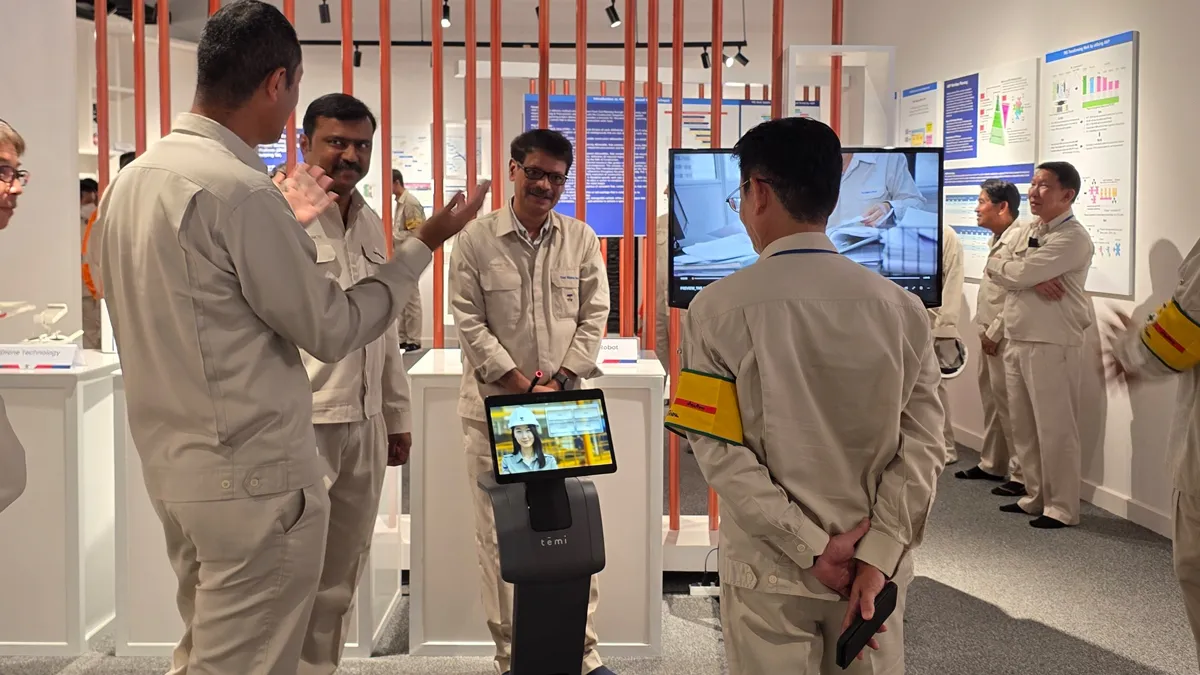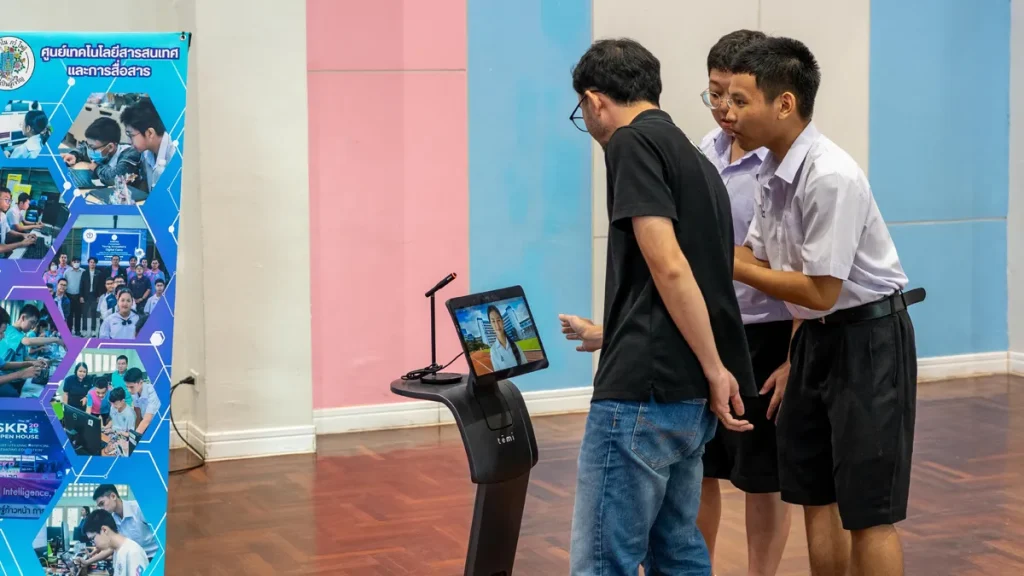Reception Robots: Innovation Transforming the Service Experience into the Digital Age

In an era where technology plays a crucial role in every business, Reception Robots have quickly become a popular solution, especially in the service industry that aims to create a memorable first impression for customers. Whether in hotels, shopping malls, hospitals, airports, or corporate offices, these robots not only answer questions and provide information but also create an impressive and modern experience for service users.
Table of Contents
What is a Reception Robot?
Reception Robots (or Receptionist Robot) isService Robotan intelligent service robot designed to welcome visitors and provide information. These robots often feature a touch display screen, are mobile, and importantly, can communicate naturally with humans through Artificial Intelligence technology.
Key Features of Reception Robots
Intelligent Communication: The robot can listen and answer questions in multiple languages, complete with facial and gesture recognition systems.
Navigation System: It can give directions or guide visitors to their destination within the building.
Queue Management: It assists in organizing queues and appointments, reducing waiting times.
Information and Promotions Display: It can display information on products, services, and various promotions via its screen.
Data Logging: It collects statistics on visitors and frequently asked questions for analysis and service improvement.

Revolutionizing Communication with AI Conversation and LLM Models
The significant turning point for reception robots today is the integration of Large Language Models (LLM) with the Artificial Intelligence system, making conversations between humans and robots far more natural and seamless than ever before.
AI Conversation: When Robots Understand the Context
The AI Conversation technology utilizing LLM models allows reception robots to:
Understand Deeper Meaning: It doesn't just catch keywords but genuinely understands the context and intent of the speaker. For example, if a customer asks, "It's so hot today, is there a seat with strong AC?", the robot understands the customer needs a cool, comfortable place to sit.
Answer Complex Questions: It can smoothly handle multi-issue or follow-up questions without needing to restart the conversation.
Adjust Communication Style: It can modify its tone and response style based on the conversational partner's personality, whether formal or casual.
Remember Conversation Context: It can recall past topics and reference them in continuous dialogue, just like conversing with a real person.
Learn and Improve Continuously: The more it is used, the more the system learns customer question patterns and needs, making answers increasingly accurate.
Examples of AI Conversation Usage in Reception Robots
In Hotels:A customer can ask the robot, "Can you recommend a delicious Italian restaurant nearby? I feel like having seafood pasta." The robot will understand the specific need and recommend a suitable restaurant, instantly displaying a map and booking a table.
In Hospitals:A patient asks, "Which floor is the orthopedics clinic on, and what should I prepare?" The robot will provide the clinic's location, floor, required documents, and estimated waiting time.
In Shopping Malls:"I want to buy a gift for my partner, budget 2,000 Baht. Any ideas?" The robot will suggest suitable products and guide the customer to the store where the items are located.

Benefits of Reception Robots for Businesses
Increased Operational Efficiency:
Robots can work 24/7 without holidays and serve multiple customers simultaneously without quality loss. This reduces the workload on human receptionists, allowing them to handle more complex and specialized tasks.
Reduced Long-Term Costs:
While the initial investment might be high, in the long run, robots save on personnel costs, reduce human error, and increase service consistency.
Creation of a Modern Brand Image:
Using a reception robot demonstrates the adoption of innovation, building brand impression and credibility, especially with new-generation customers who value technology.
Data Collection for Decision Making:
Robots can collect data on service usage, frequently asked questions, and customer behavior. This data is highly valuable for service improvement and marketing strategy planning.
Industries Suitable for Reception Robots
Hotels and Resorts:
Robots assist with check-in/check-out, answer questions about facilities, recommend local attractions, and manage guest requests.
Shopping Malls and Retail Centers:
Provide information on stores, promotions, guide to desired shops, and help in product search.
Hospitals and Clinics:
Give directions to examination rooms, departments, manage patient queues, and provide basic treatment information.
Airports and Transportation Hubs:
Provide flight information, gate details, baggage check, and answer questions about airport procedures.
Corporate Offices and Business Buildings:
Welcome visitors, verify appointments, issue visitor passes, and notify staff when guests arrive.
Educational Institutions:
Provide information on courses, buildings, classrooms, and activities within the university.

Core Technologies in Modern Reception Robots
Natural Language Processing (NLP):
This technology enables the robot to correctly understand and respond to human speech, supporting multiple languages and accents.
Computer Vision:
Helps the robot recognize faces, detect emotions, and navigate safely.
Machine Learning and Deep Learning:
Allows the robot to learn from interactions and continuously improve its responses.
IoT and Cloud Computing:
Connects the robot to other organizational systems, such as CRM, databases, and smart devices.
Choosing the Right Reception Robot
Consider Business Needs:
Define the main functions and usage required, such as greeting only, or additional features like navigation or payment.
Communication Capability:
Select a robot that supports necessary languages and features modern AI Conversation for natural communication.
Customization and Integration:
Check if the robot's appearance, personality, and connection to existing systems can be customized.
Support and Maintenance:
Choose a provider with good after-sales support, regular software updates, and a ready maintenance team.
Budget and ROI:
Calculate the total investment cost, including maintenance, and evaluate the long-term Return on Investment.
Calculate the ROI for the temi V3 robot for hotel use.
The Future of Reception Robots
Reception robot technology is developing rapidly. In the future, we will see robots with increased capabilities such as:
- More Subtle Emotion Perception: The ability to adjust responses based on user emotions and feelings.
- More Agile Movement: Better navigation and movement in complex environments.
- Multi-Robot Collaboration: Multiple robots coordinating to provide a more complete service.
- Enhanced Personalization: Recognizing regular customers and specific preferences to create personal experiences.
- Smarter AI: With the advancement of LLM models, conversations will become even more natural and effective.
Conclusion
The Reception Robot is not merely an interesting technology but a genuinely effective business tool, especially when integrated with AI Conversation technology and LLM models that make communication natural. This creates excellent customer experiences and increases operational efficiency.
Investing in a reception robot is preparation for the future of service. Organizations that adopt this technology today will gain a competitive edge, project a modern image, and effectively meet the expectations of the digital-age customer.
If you are looking for a solution to elevate your business's service level, a reception robot might be the answer you are seeking.
Request a Demo
Please provide your complete information.



















